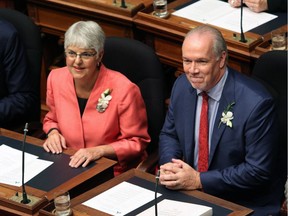British Columbians get break in MSP premiums to ring in 2018

Article content
British Columbians will ring in 2018 with a big cut in Medical Services Plan premiums, which will help offset the sting of rising ICBC rates, the provincial carbon tax increase and higher property taxes.
The NDP government’s election-promised 50-per-cent cut in MSP premiums takes effect Jan. 1 and will deliver savings of between $132 for a single adult earning between $24,001 and $26,000 up to $900 for families earning over $42,000.
“That is a heck of a lot of money,” said Kris Sims, B.C. director for the Canadian Taxpayers Federation, which offered kudos to the provincial government for quickly making good on its campaign promise and doing so simply and cleanly.
“You can put that money to a lot of great things,” Sims said. “You can spend it on fun things, or put it towards your house, or put it towards your groceries, you name it.”
Sims added that the savings are expected to improve with the NDP government’s promise to eliminate MSP premiums altogether, increasing the $900 savings being experienced by the average two-adult family starting Jan. 1 to $1,800.
The cut comes as some measure of relief in day-to-day expenses for Metro Vancouver residents still facing soaring housing costs.
On the downside, however, Sims said B.C. residents will have to put a considerable amount of it back into their gasoline bills as the other big provincial tax change is a $5-increase to the provincial carbon tax bringing it to $35 per tonne.
“For a two-car family, that’s close to $400 per year, just for carbon tax,” Sims said.
Then there is the ICBC rate increases that took effect Nov. 1, that is expected to take an average $130 more from drivers over the next year.
Food inflation is also expected to take a one to three per cent bigger bite out of household budgets on average, according to Canada’s Food Price Report, which is issued by Dalhousie University and the University of Guelph.
Property taxes are also headed up as Vancouver city council approved a 4.24-per-cent increase, Surrey’s council approved a 3.8 per cent increase and Coquitlam OK’d a 2.41 per cent increase, among Metro Vancouver municipalities.
Then all Metro Vancouver property owners will see a 4.1-per-cent rise in the cost of fees for services from the regional district, about $18 more per household on average.
On the relief side of the ledger, FortisBC natural gas rates will drop six per cent as of Jan. 1, due to lower gas costs, saving the average household about $45 per year.
And B.C. Hydro rates shouldn’t add another sting to the wallets of ratepayers as the NDP government is working to implement another election promise to freeze electricity rates for a year, which would roll back a planned three-per-cent increase set to take effect April 1.





Postmedia is committed to maintaining a lively but civil forum for discussion. Please keep comments relevant and respectful. Comments may take up to an hour to appear on the site. You will receive an email if there is a reply to your comment, an update to a thread you follow or if a user you follow comments. Visit our Community Guidelines for more information.